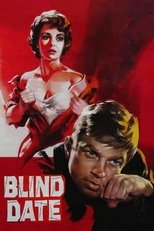John Chard
Aug 27, 2015
9/10
That's not a meeting you describe. It's a collision!
Blind Date (AKA: Chance Meeting) is directed by Joseph Losey and adapted to screenplay by Ben Barzman and Millard Lampell from the Leigh Howard novel. It stars Hardy Krüger, Stanley Baker, Micheline Presle, John Van Eyssen, Gordon Jackson and Robert Flemyng. Music is by Richard Rodney Bennett and cinematography by Christopher Challis.
Jan Van Rooyer (Krüger) arrives at the apartment of the lady he is having an affair with, only to find the police following him close behind. It appears that the lady, Jacqueline Cousteau (Presle), has been murdered and he is the prime suspect.
Another cracker-jack slice of British film noir produced by the brilliant Joseph Losey. Blind Date finds Losey on the sort of firm ground he thrives on, examining hot topics such as class consciousness, eroticism, political pot-boiling, corruption, misogyny and at the crux of the story there's a very intricate mystery to be solved. When Losey was at his best there was an edginess to his films, and this is no exception, the construction of the tale is akin to someone dangling a piece of red meat over a Lion's cage (or in this case a Cougar), only to keep pulling it away at the last second.
Hook - Line - Sinker.
It all begins in a jovial manner, Van Rooyer is so happy, skipping his way to his lover's apartment, the jazzy musical score soars and shrieks, then the tone changes considerably, Losey and his crew have offered a false dawn. It soon becomes apparent that Rooyer is something of an arrogant snot, a struggling and tortured painter, he's hard to empathise with as he gets leaned on first by Gordon Jackson's efficient copper, then the mighty presence of Stanley Baker as Inspector Morgan - with Welsh accent joyously in full effect, he's nursing a cold and drinking milk, but boyo this is a guy you don't want grilling you...
Cougarville.
Rest of the picture is predominantly told in flashback, how Rooyer and Cousteau came to meet, their initial sparring and eventual relationship, with the mature femme fatale lady wrapping the hapless painter around her finger. Losey sexes things up, really gets as much heat as he can into the coupling without bothering the censors, he even slots in a sex metaphor that Hitchcock would have approved of. Then the rug pulls begin, the can is opened, worms everywhere, or is it just smoke and mirrors?
Losey and Challis use every opportunity to use trusted film noir photographic techniques, but never in a lazy manner. Some of the isolated lighting used - particularly when Presle is holding court - is cheeky but potent with it, and the close ups, long takes and wide frames favoured by Losey ensure that no scene is merely being allowed to be ordinary. Baker, like Dirk Bogarde, was a classic Losey man, a meeting of minds that produced performances of steel and psychological intricacy. Yet it's not Baker who owns this film, it's Krüger, a multifaceted jumping-bean of a performance, simply terrific. As is the film itself, one of Losey's most under valued British treasures. 9/10
